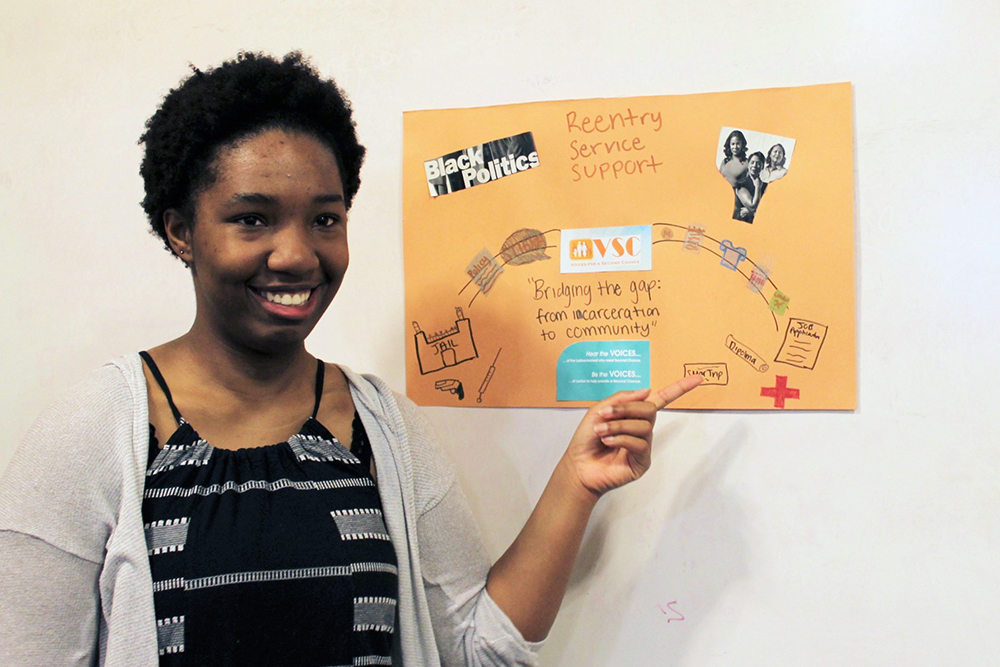For many hosting organizations in the Washington DC region, the work of student-interns from Eastern Mennonite University’s Washington Community Scholars’ Center (WCSC) is invaluable.
“Without interns and volunteers,” said one supervisor at the Catholic Charities Refugee Service Center, “we can’t run the program.”

Located in the nation’s capital since 1976, WCSC has cultivated partnerships with internship sites for decades. The program works to match participants with internships that not only fit their majors and areas of interest, but also help them engage with and support the broader DC community. The process of carefully matching students with internship sites means that each semester includes new partnerships and helps to build upon an expanding network of connections between EMU and local DC organizations that hold similar values to the university and its students.
This semester, the program placed three students at new partner organizations. Senior Abby Musser is interning at the media outlet Just Vision, which reports on peaceful engagement in the Israel-Palestine conflict. Senior Jonatan Moser is assisting at Catholic Charities’ Refugee Service Center offering resources to asylees. Sophomore Gabby McMillon is working with Voices for a Second Chance, which supports those affected by the criminal justice system.
As all three students are experiencing this semester, carefully chosen internships offer new perspectives on potential careers in their areas of study.
“I’m really enjoying learning the practical side of nonprofits and media. [Internships] are a good way to see if this is something I want to pursue later,” Musser said. She helps the organization find venues to showcase their documentaries, which highlight Israeli and Palestinian leaders who are collectively working to end the conflict and create a future of freedom and equality for all living in the region.

Her supervisor, Daniel Nerenberg, also takes it upon himself to foster practical learning. “You can be preparing [interns] for the possibility of future work,” he notes, explaining how the research and organizational skills that interns learn at Just Vision help them to thrive in work environments on the larger scale.
These insights into organizational structures and natural workflows are practical skills that transfer across disciplines and beyond the classroom. At the Catholic Charities Refugee Service Center where he mans the front desk, Moser is not only practicing critical social work skills to fulfill his major’s practicum requirement, but also acts as the front line for the organization. A highlight of his work is seeing the surprise in Spanish-speaking clients’ faces when he responds to them in their native language. These clients include asylees, refugees and victims of human trafficking.
The goal of the Refugee Service Center is to help clients find jobs and navigate the American work culture so that they can resettle and rebuild their lives. Moser has also been tasked with a new project for the organization. He is researching how to help the children of these clients enter and find success in the local school system.
McMillon has also received a crash-course in navigating new work environments and social spheres. At Voices for a Second Chance, she assists with administrative work and helps to connect the organization with other community partners and potential grants. She also shadows their social workers. The non-profit provides case management for inmates, resources for families affected by incarcerated members, and reentry support for those who have been through the criminal justice system.
This environment offers “the chance to confront a lot of your biases and to interact with people you wouldn’t otherwise at all,” McMillon said. “Coming from a place of privilege, especially as college students, you learn the cultural competency you need and are guided through the process.”
From Program Director Margot Kirkland-Isaac’s perspective, interns play a vital role in the culture of their small non-profit. “Especially with younger staff [interns], they know things us older staff don’t know and they’re often very techie” she joked, then added on a more serious note that interns bring “new and fresh ideas, new eyes, new perspectives and new ways of thinking outside the box and strategizing.”
Several times in the past year, Kirkland-Isaac and her co-workers reached out to the WCSC looking for interns with interest in the criminal justice system. McMillon was a good fit: She came to the program with interests in engaging with societal issues and inequities that she’d been discussing in academic courses for her peacebuilding and development major.
This relationship highlights the reciprocal role that interns and organizations can have when carefully matched. It demonstrates the WCSC’s objective to match the unique interests and developing skills of incoming interns with organizations such as Voices for a Second Chance, Catholic Charities and Just Vision that rely on and offer meaningful opportunities for interns.

Great work and presentation and awesome UI! Congrats!